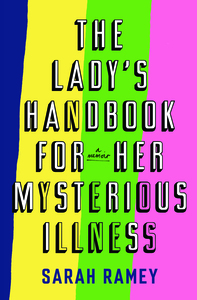You need to sign in or sign up before continuing.
Take a photo of a barcode or cover
As someone who lives with chronic pain that has a specific reason, I can only imagine what chronic pain without a diagnosis is like. Sarah Ramey tells the whole truth here, without flinching, and calls every person to really listen to her story. It isn't for the faint of heart but, then again, I suppose that is the point: that not a one of us is faint of heart and we would do well to pay attention to each other. An important, essential book.
*I received a digital ARC from the publisher via NetGalley in exchange for an honest review.*
*I received a digital ARC from the publisher via NetGalley in exchange for an honest review.*
emotional
funny
hopeful
informative
inspiring
reflective
sad
medium-paced
challenging
dark
emotional
hopeful
informative
inspiring
sad
fast-paced
challenging
emotional
informative
medium-paced
This book was painful in how quickly it flipped back and forth between helpful advise and good story telling, and just garbage. The biggest failure in this book is lack of editing - the author is just not a good writer and relies on tropes, metaphors, references to other authors/works, etc. to an exhausting extent. She also presents personal theories as "scientific findings and research", which is a dangerous lie. I agree with much of what she says about the healthcare industry and state of general health in our society, but she adds a lot of unnecessary theorizing, especially when it comes to her views on feminism. Not to mention her IMMENSE privilege, which is barely acknowledged and which makes most of, if not all, of her advice inaccessible to most people. (Sidenote: calling your memoir a "handbook" and then failing to give almost any advice beyond eat healthy is a strong choice.) Someone needs to tell Sarah that most people do not grow up like she did, that she cannot be both exceedingly ordinary and a remarkable case, no matter how much she wants to be, and that the fact that most women experience sexual trauma in their lives does not mean that trauma is a precursor of WOMIdom. Correlation does not equal causation and if she does not understand this most basic tenent of science, she has no business writing a "medical" book.
Overall, this book made me sad. Mostly because if 60% of it had been cut, I think it could have been a great and highly valuable read. As is, very few people will want to read it, and the way it's written will alienate most others.
Overall, this book made me sad. Mostly because if 60% of it had been cut, I think it could have been a great and highly valuable read. As is, very few people will want to read it, and the way it's written will alienate most others.
emotional
informative
lighthearted
reflective
slow-paced
DNF. Part of me loved this book for handling chronic illness, but it needed to be about one half the length. The author strained at humor and became weirdly prescriptive at the midpoint.
I thought I was going to love this book and for the first couple of chapters I really related to what the writer was saying. Then I got lost and confused. A lot of strange theories, a lot of unscientific stuff, I got close to the end but dnf
hopeful
informative
inspiring
sad
medium-paced
slow-paced
To be honest, I couldn’t finish this one. It sounded fascinating, and the first 30% or so was really really interesting. However, it got seriously repetitive and incredibly hard to follow. When I was at page 228 with about 200 pages left to go, I realized I was skimming more than I was actually reading and gave up.
One of the best books I've ever read. A thousand percent worth it for anyone who has ever gone to the doctor and been ignored, or doubted, or looked at like they were crazy. Could not recommend more.

